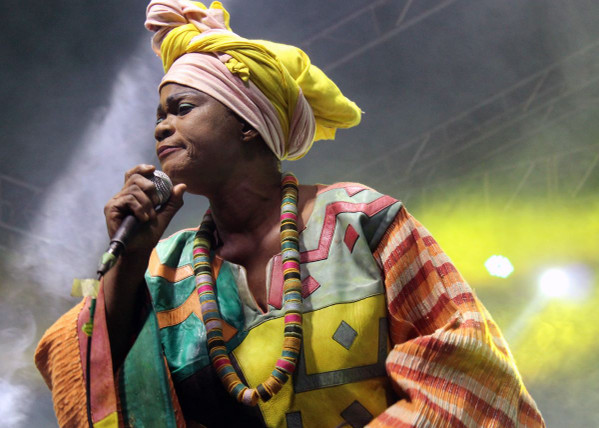


NEWS:
Only a few days left to hear our September stream - otherwise go to MixCloud to listen without detailed artist/gig info
Artist Info
|
Nahawa Doumbia  Image from Discogs  Nahawa Doumbia is one of the most popular singers from the Wassoulou region in South Mali. She speaks to the younger generation of West Africa through her lyrics about love, the position of women in Malian society, and the plight of the African refugees in France. Her voice soars to didadi, a lilting dance rhythm from her native Wassoulou region; added to the musical mix are the jazz and techno samples of French DJ Frédéric Galliano. Traditional instruments -bala, kamel'ngoni, and djembe- along with bass and acoustic guitar back up Nahawa's vibrant vocals. Nahawa Doumbia is one of the most popular singers from the Wassoulou region in South Mali. She speaks to the younger generation of West Africa through her lyrics about love, the position of women in Malian society, and the plight of the African refugees in France. Her voice soars to didadi, a lilting dance rhythm from her native Wassoulou region; added to the musical mix are the jazz and techno samples of French DJ Frédéric Galliano. Traditional instruments -bala, kamel'ngoni, and djembe- along with bass and acoustic guitar back up Nahawa's vibrant vocals. Nahawa Doumbia was born in the small town of Mafélé, in the Sikasso region (next to the Ivory Coast’s border). Her grandmother had to raise the newborn because Nahawa’s mother died shortly after giving birth. Nahawa Doumbia’s grandmother lived in Manankoro, near Bougouni, the most important city in the Wassoulou region (south of Bamako, Mali’s capital). The Wassoulou region is well known for generating some of the best singers in Mali, like Oumou Sangare, Sali Sidibe or Dieneba Diakité. Even though Nahawa Doumbia’s family was not part of the jali tradition (the Manding caste that performs music), Nahawa’s mother predicted before she died that her daughter would be a singer. This is something that her family tried to prevent, resorting to the magical powers of blacksmiths, but to no effect. The young Malian woman was discovered by civil servants from the Ministry of Culture when she was singing with her friends. Despite her father’s opposition, she sung at the Youth Week in Bamako in 1980, a biannual event in which artists from all of Mali participate. Nahawa Doumbia won the contest with the song "Tinye de be laban." Since then and always accompanied by her husband, guitarist Ngou Bagayoko, her fame grew in Mali and Europe. She shared the stage Manu Dibango, Toure Kunda or Miriam Makeba. In 1988 Nahawa’s first album, "Didadi," came out. Ibrahima Sylla and Boncana Maiga, the creators of modern Manding music produced it. Didadi is, in fact, the music style with which Nahawa Doumbia stands out, a rhythm used by young people to compete at festivals and celebrations. In 1990 her second CD came out, with the collaboration of well known African musicians: Congolese guitarist Rigo Star, Cameroonian singer Georges Seba, percussionist Papa Kouyate and several of Salif Keita’s band members. Nahawa Doumbia’s first recordings are characterized by the fusion of African music and modern technology. Her fourth release, "Yankaw," meant a return to pure Wassoulou music with vocals accompanied by balafon, kamel'ngoni, acoustic guitar and percussion. Read more on Last.fm. User-contributed text is available under the Creative Commons By-SA License; additional terms may apply. Artist biography from last.fm Some other places to look for information: last.fm Discogs MusicBrainz |
